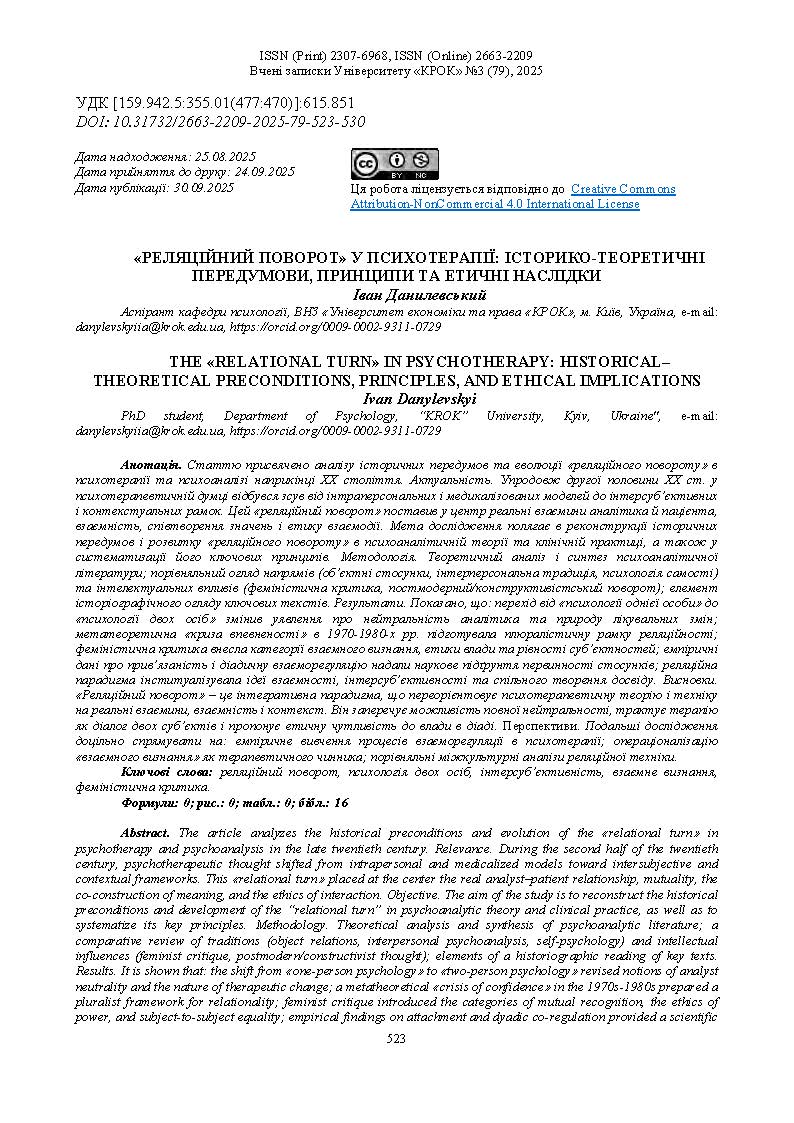THE «RELATIONAL TURN» IN PSYCHOTHERAPY: HISTORICAL–THEORETICAL PRECONDITIONS, PRINCIPLES, AND ETHICAL IMPLICATIONS
DOI:
https://doi.org/10.31732/2663-2209-2025-79-523-531Keywords:
relational turn, two-person psychology, intersubjectivity, mutual recognition, feminist critiqueAbstract
The article analyzes the historical preconditions and evolution of the «relational turn» in psychotherapy and psychoanalysis in the late twentieth century. Relevance. During the second half of the twentieth century, psychotherapeutic thought shifted from intrapersonal and medicalized models toward intersubjective and contextual frameworks. This «relational turn» placed at the center the real analyst–patient relationship, mutuality, the co-construction of meaning, and the ethics of interaction. Objective. The aim of the study is to reconstruct the historical preconditions and development of the “relational turn” in psychoanalytic theory and clinical practice, as well as to systematize its key principles. Methodology. Theoretical analysis and synthesis of psychoanalytic literature; a comparative review of traditions (object relations, interpersonal psychoanalysis, self-psychology) and intellectual influences (feminist critique, postmodern/constructivist thought); elements of a historiographic reading of key texts. Results. It is shown that: the shift from «one-person psychology» to «two-person psychology» revised notions of analyst neutrality and the nature of therapeutic change; a metatheoretical «crisis of confidence» in the 1970s-1980s prepared a pluralist framework for relationality; feminist critique introduced the categories of mutual recognition, the ethics of power, and subject-to-subject equality; empirical findings on attachment and dyadic co-regulation provided a scientific grounding for the primacy of relationships; the relational paradigm institutionalized the ideas of mutuality, intersubjectivity, and co-created experience. Conclusions. The «relational turn» is an integrative paradigm that re-orients psychotherapeutic theory and technique toward real relationships, mutuality, and context. It rejects the possibility of full neutrality, frames therapy as a dialogue between two subjects, and calls for ethical sensitivity to power within the dyad. Perspectives. Further research should focus on: empirical study of co-regulatory processes in psychotherapy; operationalizing «mutual recognition» as a therapeutic factor; and cross-cultural comparative analyses of relational technique.
Downloads
References
Aron, L. (1996). A meeting of minds: Mutuality in psychoanalysis. Analytic Press.
Beebe, B., & Lachmann, F. M. (2003). Infant research and adult treatment: Co-constructing interactions. Analytic Press.
Benjamin, J. (1988). The bonds of love: Psychoanalysis, feminism, and the problem of domination. Pantheon Books.
Benjamin, J. (1995). Like subjects, love objects: Essays on recognition and sexual difference. Yale University Press.
Berman, E. (1997). Relational psychoanalysis: A historical background. American Journal of Psychotherapy, *51* (2), 185–203. https://doi.org/10.1176/appi.psychotherapy.1997.51.2.185
Chodorow, N. J. (1978). The reproduction of mothering: Psychoanalysis and the sociology of gender. University of California Press.
Cooper, S. H. (2010). A disturbance in the field: Essays in transference-countertransference engagement. Routledge.
Greenberg, J. R., & Mitchell, S. A. (1983). Object relations in psychoanalytic theory. Harvard University Press.
Harris, A. (1994). Gender practices and the relational unconscious. Psychoanalytic Dialogues, *4*(2), 213–224. https://doi.org/10.1080/10481889409539014
Hoffman, I. Z. (1998). Ritual and spontaneity in the psychoanalytic process: A dialectical-constructivist view. Analytic Press.
Horney, K. (1939). New ways in psychoanalysis. W. W. Norton & Company.
Mitchell, J. (1974). Psychoanalysis and feminism: A radical reassessment of Freudian psychoanalysis. Pantheon Books.
Mitchell, S. A. (1988). Relational concepts in psychoanalysis: An integration. Harvard University Press.
Mitchell, S. A. (1993). Hope and dread in psychoanalysis. Basic Books.
Mitchell, S. A. (1997). Influence and autonomy in psychoanalysis. Analytic Press.
Mitchell, S. A. (2000). Relationality: From attachment to intersubjectivity. Analytic Press.

Downloads
Published
How to Cite
Issue
Section
License

This work is licensed under a Creative Commons Attribution-NonCommercial 4.0 International License.

